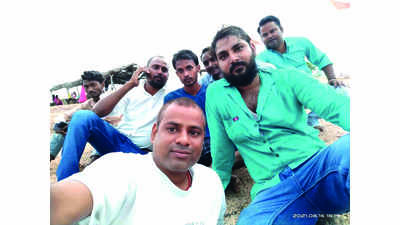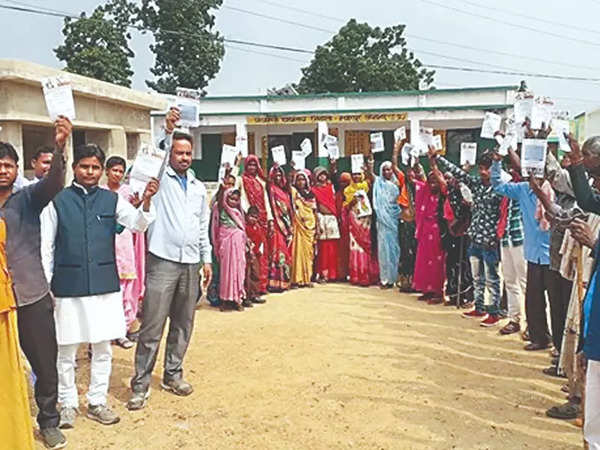- News
- City News
- lucknow News
- UP elections: Before receding into history, 11 villages of Sonbhadra to vote for ‘one last time’
Trending
This story is from January 18, 2022
UP elections: Before receding into history, 11 villages of Sonbhadra to vote for ‘one last time’
Vishwanath Kharwar’s electoral identity has been that of a voter from Sundari village of Duddhi assembly seat (numbered 403 among 403 constituencies) in Sonbhadra district but after this year’s election, this facet of his identity will change forever.

Locals of Bagharu village take selfie at Pahadi Baba Asham which will slip into history when Kanhar dam gets operational.
LUCKNOW: Vishwanath Kharwar’s electoral identity has been that of a voter from Sundari village of Duddhi assembly seat (numbered 403 among 403 constituencies) in Sonbhadra district but after this year’s election, this facet of his identity will change forever.
Reason: Sundari is one of the 11 villages of Duddhi constituency which will slip into history as the area will be devoured by the waters of Kanhar Dam Project which is expected to get operational by the end of this year.
On the threshold of change, Vishwanath only hopes to get a better deal for his grandchildren in lieu of their ancestral land and legacy.
 Locals feel nostalgic about the “last elections” in their native place.
Locals feel nostalgic about the “last elections” in their native place.
Locals feel nostalgic about the “last elections” in their native place.
“After the Uttar Pradesh elections, things will change. The river water will flow on our land and we all will be scattered in different parts of Sonbhadra. I can only pray that our last vote from here ensures a better future,” said
Speaking about the plight of over 25,000 voters across these 11 villages (total estimated population is 50,000), Gambhira Prasad, former head of Korchi village, is approaching all parties to press for their demands.
“Parties lend us an ear only during polls. We have decided to support those who promise to do something for us,” Prasad said.
Irrigation department officials said over 65% of the land for the project had been acquired but some were refusing to support them.
Prasad said the villagers were demanding that the amount of compensation should be doubled, at least one member of the displaced families be provided a job, a house under the PM Avas Yojana and agricultural land.
Shiva Prasad from Bhisur village said: “We are farmers and land acquisition will affect our lives. Agricultural land would at least give us food to eat. ”
Three states to benefit from project
Launched in1976, Kanhar Dam project aims to benefit parts of UP, Chhattisgarh and Jharkhand. The project began with an estimated cost of Rs 27.75 crore but swelled to an estimated Rs 2,000 crore due to delay. Under the project, a 39-metre high and 3.2km long dam will be constructed to store 0.15 million acre feet of water. It also includes construction of 121km long canals to irrigate over 35,000 hectares of agricultural land which will benefit 108 villages in Duddhi and Chopal development blocks of Sonbhadra. In the process, some 2,500 families are to be displaced.
Constituency has over 3.1 lakh voters
Initially a reserved Scheduled Caste seat, Duddhi was declared a Scheduled Tribe seat after delimitation in 2008. Currently, it is represented by Hariram of the Apna Dal (Sonelal) who won the election in 2017, defeating Bahujan Samaj Party’s Vijay Singh Gond with a narrow margin of1,085 votes. Gond was elected MLA from here in1985,1989,1991, 1993, 1996 and 2002. There are over 3.1lakh voters in the constituency.
Reason: Sundari is one of the 11 villages of Duddhi constituency which will slip into history as the area will be devoured by the waters of Kanhar Dam Project which is expected to get operational by the end of this year.
On the threshold of change, Vishwanath only hopes to get a better deal for his grandchildren in lieu of their ancestral land and legacy.

“I was barely 10 when the foundation stone for this dam was laid in 1976. A good part of our lives has gone in waiting for the project to commence. When things started moving, we were handed a raw deal. Each family is getting barely Rs 7.11 lakh in lieu of their land,” he said, demanding a hike in compensation.
Locals feel nostalgic about the “last elections” in their native place.
“After the Uttar Pradesh elections, things will change. The river water will flow on our land and we all will be scattered in different parts of Sonbhadra. I can only pray that our last vote from here ensures a better future,” said
Rani Devi of Sugwaman village.
Speaking about the plight of over 25,000 voters across these 11 villages (total estimated population is 50,000), Gambhira Prasad, former head of Korchi village, is approaching all parties to press for their demands.
“Parties lend us an ear only during polls. We have decided to support those who promise to do something for us,” Prasad said.
Irrigation department officials said over 65% of the land for the project had been acquired but some were refusing to support them.
Prasad said the villagers were demanding that the amount of compensation should be doubled, at least one member of the displaced families be provided a job, a house under the PM Avas Yojana and agricultural land.
Shiva Prasad from Bhisur village said: “We are farmers and land acquisition will affect our lives. Agricultural land would at least give us food to eat. ”
Three states to benefit from project
Launched in1976, Kanhar Dam project aims to benefit parts of UP, Chhattisgarh and Jharkhand. The project began with an estimated cost of Rs 27.75 crore but swelled to an estimated Rs 2,000 crore due to delay. Under the project, a 39-metre high and 3.2km long dam will be constructed to store 0.15 million acre feet of water. It also includes construction of 121km long canals to irrigate over 35,000 hectares of agricultural land which will benefit 108 villages in Duddhi and Chopal development blocks of Sonbhadra. In the process, some 2,500 families are to be displaced.
Constituency has over 3.1 lakh voters
Initially a reserved Scheduled Caste seat, Duddhi was declared a Scheduled Tribe seat after delimitation in 2008. Currently, it is represented by Hariram of the Apna Dal (Sonelal) who won the election in 2017, defeating Bahujan Samaj Party’s Vijay Singh Gond with a narrow margin of1,085 votes. Gond was elected MLA from here in1985,1989,1991, 1993, 1996 and 2002. There are over 3.1lakh voters in the constituency.
End of Article
FOLLOW US ON SOCIAL MEDIA










